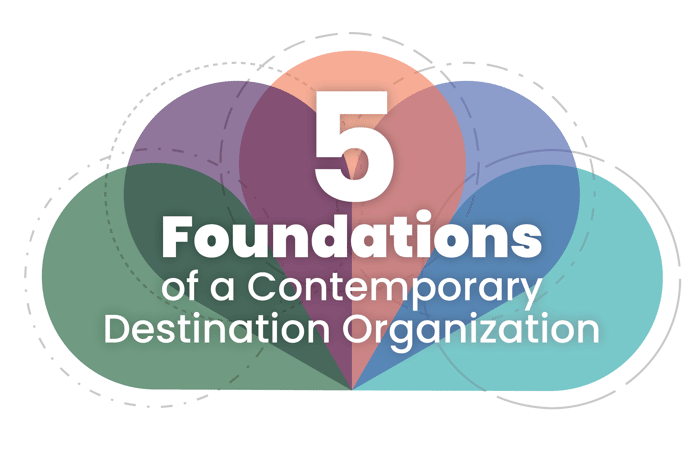The Five Foundations of a DMO: New Measures for a New Paradigm
During the past five years, our industry has seen a marked shift in the activities of Destination Management and Marketing Organizations (DMOs), from pure marketing and sales-driven entities to an integrated approach with product development, visitor distribution, and a greater emphasis on community engagement and resident quality of life. These are the makings of a true DMO. Instead of analyzing the community objectively, DMOs become part of the fabric of a community’s success and growth - beneficial to the cities with which they work, the people who live in them, and the tourists who visit them.
Level Up the Community
Despite DMOs’ expanded thinking and efforts, they are held back by legacy measurement practices. What if DMOs were able to focus beyond heads in beds and single metric visitor volume to understand economic impact, expand seasonality, and expand opportunities of the visitor economy without overwhelming residents? This unlocks the truly transformative power of the visitor economy for destinations.
Over 200 DMO partners look to Zartico to transform big data sets into a higher resolution view of the visitor economy to uncover new details, comprehending the destination in greater context, yielding more confidence in next steps. Our partners are asking pioneering questions providing insight into how visitor economies work, what is successful and how DMOs can level up to better lead their communities. Through this work, we’re seeing five themes emerge among partners large and small, that revolutionize the way to measure and understand destination performance.
We’ve come to call these themes the Foundations for a Contemporary DMO. They are an integrated set of best practices any DMO can use to improve strategic planning, operational excellence, stakeholder engagement and alignment and ultimately lead their visitor economies to greater heights. In this article, we introduce the five foundations. 
1. Demand Generation: Increasing awareness and generating demand has been, and will continue to be, the primary focus for most DMOs. A newer opportunity lies in using high-frequency, high-resolution data sets taking advantage of machine learning and data science for greater impact and more control over the visitor economy. Think of shaping demand around attracting the right volume and right type of visitors as opposed to simply driving more volume during peak months. Generating demand with more precision can help DMOs lead their visitor economy to greater equity, economic opportunity or to alleviate the pressures of destinations over capacity.
Making these changes enables the next four foundational elements.
“People want to visit communities where people want to live.” Elizabeth Becker, author of Overbooked
This is the most active area of current research for our data science team as we quantify the effects of our partners’ visitor dispersion programs, to highlight marketing opportunities to efficiently attract off-season or mid-week visitors and those willing to venture off the beaten path. Traditional measures like pageviews, click-through-rates and marketing ROI bias toward increasing volume in already popular areas and times of year. Instead, we recommend looking at the unsold inventory in your hotel report, the characteristics of your mid-week and off season visitation and using tools like website attribution to understand your role in influencing where and when people visit your destination.
3. Economic Opportunity: At Zartico, we’re champions of the visitor economy as the hidden engine of economic development. We see it in the data every day. We expect visitors to come to the beaches, the trails, museums and amusement parks and have associated this visitation with hotel revenues. But what about those same visitors who visit retail shops, restaurants and grocery stores? Even less is the economic impact of visitors to medical facilities, universities, business travel and visiting friends and relatives. However, each of these visitor activities generates revenues for local businesses and leaves behind tax revenues for community services and are therefore essential for the DMO to understand in order to effectively manage their visitor economy.
We are inspired by DMOs beginning to develop programs to promote women and minority owned businesses, and those developing additional services to help visitors understand the history, culture and community within a destination. These activities focus on generating better visitation, not just more visitation. It helps make the visitor economy a more prominent component of community economic development, entrepreneurship and the development and preservation of community character.
4. Accountability: DMOs are stewards of taxpayer dollars and as a result, have greater responsibility to be good stewards of their budgets. Yet without a cash register, or a customer record, precisely measuring and effectively communicating the positive impacts of the DMO is challenging. The most successful DMOs we work with set clear strategic goals for their organization, engage regularly and transparently with local elected officials, and focus measurement strategies on achieving a limited number of high-value strategic outcomes. This work often gives these DMOs a more proactive role in community and economic development and leads to greater community support for tourism.
Within the Zartico Operating System, our advisors configure specific goals for program performance against the top-level strategic objectives. When encompassed within the Executive Brief, this becomes a shared scorecard for a DMO’s accomplishments, generates alignments against key objectives, and provides clearer talking points for the DMO to share with stakeholders. Other DMO partners have created a board module—a subset of their Zartico OS modules—on which the board can login at their convenience and see performance against goals. Using a board module for pre-reading prior to a board meeting allows the focus of the meeting to be on alignment and action steps and not on reporting, which generates deeper, more meaningful engagement among boards and staff.
“Transparency breeds trust, which breeds prosperity.”
Paul Polman, former CEO of Unilever
5. Stability: Higher levels of trust, accountability, transparency and alignment between the visitor economy and community goals reinforces the value of greater financial and community support for the DMO. In turn, stable funding and strong partnerships allows the DMO to focus their efforts on long-term plans to grow the visitor economy as opposed to constantly playing defense to protect budgets.
Stability also comes from a DMO’s funding mechanism, with many city/county CVBs and DMOs finding great value through a Tourism Business Improvement District, or TBID, that levies an additional tax on hotel stays in the district to be used for marketing, sales and improvements to the district. This provides a clearer funding vehicle for DMOs and brings with it additional accountability requirements by the businesses within the district to ensure funds are put to the benefit of participating businesses in the district.
Finally, stability comes from a DMO’s resilience and ability to rebound when a crisis hits. Whether that is a wildfire, hurricane, economic downturn or global pandemic, we’ve seen the remarkable ways DMOs serve their communities in the most exceptional of circumstances. By nature, DMOs have a cross-disciplinary team, are excellent storytellers and are champions of the communities they serve, and never is this more evident than when a community is facing a crisis.
Demand, distribution, opportunity, accountability, stability - the future of DMOs is available now, providing you greater visibility, control and ownership of the visitor economy. The Zartico Team has more than 200 combined years of experience in destinations and working with DMOs. We have seen the transformative power of the visitor economy and experienced the dedication, passion and the commitment to service DMOs bring to their community. We are excited to partner with you to help you create more balance and consistency for your community, develop better relationships with drivers of the local economy, create accountability for your work and, finally, a stable foundation to weather any storm.



